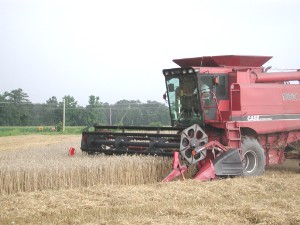Today, Michael Pollan (author of “The Omnivore’s Dilemma” and “The Botany of Desire”) had a fascinating article in the New York Times Magazine about how the agribusiness is who determines what we eat, and how the farm bill, which passes Congress every 5 years, affect almost every aspect of our lives and in turn affects people all over the globe.
For a nation that is increasingly more and more concerned about obesity, it is incredible to realize that dollar for dollar you can get more calories/more food from highly processed foods than you can from more natural foods. A study by Adam Drewnowski from the University of Washington found that a dollar can get you 1,200 calories from cookies or potato chips, but only 250 worth of calories from carrots. This set up hardly makes sense, “junk food” is highly processed and should therefore cost much more, but this is where the farm bill comes into play.
 The USA farm bill, among other things, determined which crops will be subsidized, and the five favored crops are corn, soybeans, wheat, rice and cotton, the first three being the main ingredients of “junk food.” These subsidies have created a saturation in the market place for these products at the expense of denying us a more balanced diet at an affordable price. It also means that these products can compete in the international market place at an unfair advantage, and thereby have the ability of being sold in foreign markets at lower prices than locally grown food. The hypocrisy of it hits when you realize that the USA lobbies as much as they can in the world market to prevent other countries from subsidizing their products, but yet that is exactly what happens here. This unfair marketing approach has created a situation in which USA grown corn can sell cheaper in Mexico, than locally grown corn. This also means that Mexicans are eating corn that has a lot more chemical than the local crop. Given the situation it is only obvious that Mexican farmers, and others around the world who have been put out of business by this set up try to make a living elsewhere, in many cases that means immigrating to the USA in search of a better life.
The USA farm bill, among other things, determined which crops will be subsidized, and the five favored crops are corn, soybeans, wheat, rice and cotton, the first three being the main ingredients of “junk food.” These subsidies have created a saturation in the market place for these products at the expense of denying us a more balanced diet at an affordable price. It also means that these products can compete in the international market place at an unfair advantage, and thereby have the ability of being sold in foreign markets at lower prices than locally grown food. The hypocrisy of it hits when you realize that the USA lobbies as much as they can in the world market to prevent other countries from subsidizing their products, but yet that is exactly what happens here. This unfair marketing approach has created a situation in which USA grown corn can sell cheaper in Mexico, than locally grown corn. This also means that Mexicans are eating corn that has a lot more chemical than the local crop. Given the situation it is only obvious that Mexican farmers, and others around the world who have been put out of business by this set up try to make a living elsewhere, in many cases that means immigrating to the USA in search of a better life.
The light at the end of the tunnel here is that more and more groups are starting to realize just how this farm bill affects us. Public health groups are realizing that issues like obesity and diabetes cannot be fully addressed without talking about this bill. Environmentalists see that this bill means massive agribusiness initiatives, which in turn mean more polluted land, air, and water due to the high use of chemicals. Even the huge world organizations seem to be speaking out about this unfair bill. In 2004 the World Trade Organization ruled that USA cotton subsidies were illegal; hopefully they will continue speaking up.
On a related note, a great documentary on this and similar issues is Life and Debt, by Stephanie Black.
06.07.07 – A recent article on thruthout.com continues this discussion around the USA Farm bill. The article explains the dynamics of how big agribusiness benefit from this bill. Large poultry producers benefit from receiving highly subsidized chicken feed (corn). These discrepancies continue when the USA exports the chicken parts that aren’t liked as much here to developing countries, at rock bottom prices, and in doing so they help destroy local production. Ironically a number of peasants in other countries affected by these global economic dynamics end up immigrating to the USA to work at the very plants that helped destroy their initial livelihood.
Image information here.